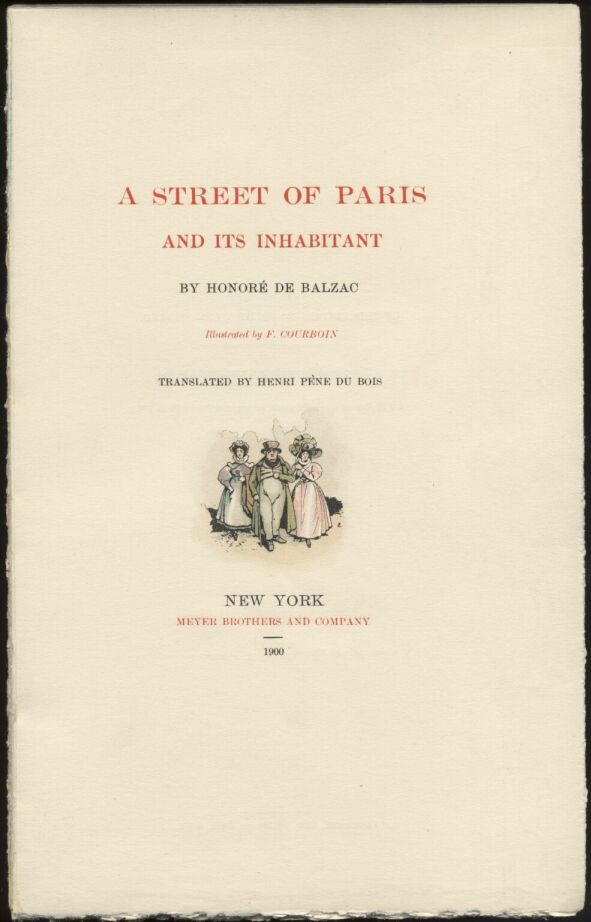
Project Gutenberg's A Street Of Paris And Its Inhabitant, by Honore De Balzac This eBook is for the use of anyone anywhere at no cost and with almost no restrictions whatsoever. You may copy it, give it away or re-use it under the terms of the Project Gutenberg License included with this eBook or online at www.gutenberg.org Title: A Street Of Paris And Its Inhabitant Author: Honore De Balzac Release Date: November 1, 2006 [EBook #8150] Language: English Character set encoding: ISO-8859-1 *** START OF THIS PROJECT GUTENBERG EBOOK A STREET OF PARIS *** Produced by Dagny, John Bickers and David Widger

This eBook was prepared from an edition published by Meyer Brothers and Company, New York, 1900.
Of this edition 400 copies were printed. 25 copies on Japan Paper, numbered 1 to 25. 375 copies on specially made paper, numbered 26 to 400.

This little Parisian silhouette in prose was written by Balzac to be the first chapter of a new series of the "Comedie Humaine" that he was preparing while the first was finishing. Balzac was never tired. He said that the men who were tired were those who rested and tried to work afterwards.
"A Street of Paris and its Inhabitant" was in its author's mind when Hetzel, engaged in collecting a copy for the work entitled "Le Diable a Paris" that all book lovers admire, asked Balzac for an unpublished manuscript.
Balzac gave him this, after retouching it, in order that it should have the air of a finished story. Why Hetzel did not use it in "Le Diable a Paris," no one knows. He went into exile, in Brussels, at the military revolution that made Napoleon III Emperor and, needing money, sold "A Street of Paris and its Inhabitant" with other manuscripts to Le Siecle.
Balzac's work was printed entire in three pages of the journal Le Siecle, in Paris, July 28, 1845. M. le Vicomte Spoelberch de Lovenjoul owns Balzac's autograph manuscript of it. These details are given by him and might be reproduced here with his signature. But the publishers wish not to be deprived of the pleasure of paying homage to the Vicomte Spoelberch de Lovenjoul.
He has made in the biography of Balzac, in editions of his books, in the pious collection of his unpublished writings, the ideal literary man's monument.
H. P. du B.

Paris has curved streets, streets that are serpentine. It counts, perhaps, only the Rue Boudreau in the Chaussee d'Antin and the Rue Duguay-Trouin near the Luxembourg as streets shaped exactly like a T-square. The Rue Duguay-Trouin extends one of its two arms to the Rue d'Assas and the other to the Rue de Fleurus.
In 1827 the Rue Duguay-Trouin was paved neither on one side nor on the other; it was lighted neither at its angle nor at its ends. Perhaps it is not, even to-day, paved or lighted. In truth, this street has so few houses, or the houses are so modest, that one does not see them; the city's forgetfulness of them is explained, then, by their little importance.
Lack of solidity in the soil is a reason for that state of things. The street is situated on a point of the Catacombs so dangerous that a portion of the road disappeared recently, leaving an excavation to the astonished eyes of the scarce inhabitants of that corner of Paris.
A great clamor arose in the newspapers about it. The government corked up the "Fontis"—such is the name of that territorial bankruptcy—and the gardens that border the street, destitute of passers-by, were reassured the more easily because the tax list did not weigh on them.
The arm of the street that extends to the Rue de Fleurus is entirely occupied, at the left, by a wall on the top of which shine broken bottles and iron lances fixed in the plaster—a sort of warning to hands of lovers and of thieves.

In this wall is a door, the famous little garden door, so necessary to dramas and to novels, which is beginning to disappear from Paris.
This door, painted in dark green, having an invisible lock, and on which the tax collector had not yet painted a number; this wall, along which grow thistles and grass with beaded blades; this street, with furrows made by the wheels of wagons; other walls gray and crowned with foliage, are in harmony with the silence that reigns in the Luxembourg, in the convent of the Carmelites, in the gardens of the Rue de Fleurus.
If you went there, you would ask yourself, "Who can possibly live here?"
Who? Wait and see.

One day, about three in the afternoon, that door was opened. Out of it came a little old man, fat, provided with an abdomen heavy and projecting which obliges him to make many sacrifices. He has to wear trousers excessively wide, not to be troubled in walking. He has renounced, long ago, the use of boots and trouser straps. He wears shoes. His shoes were hardly polished.
The waistcoat, incessantly impelled to the upper part of the gastric cavities by that great abdomen, and depressed by the weight of two thoracic bumps that would make the happiness of a thin woman, offers to the pleasantries of the passers-by a perfect resemblance to a napkin rolled on the knees of a guest absorbed in discussion at dessert.
The legs are thin, the arm is long, one of the hands is gloved only on most solemn occasions and the other hand ignores absolutely the advantage of a second skin.

That personage avoids the alms and the pity that his venerable green frock coat invites, by wearing the red ribbon at his button-hole. This proves the utility of the Order of the Legion of Honor which has been contested too much in the past ten years, the new Knights of the Order say.
The battered hat, in a constant state of horror in the places where a reddish fuzz endures, would not be picked up by a rag picker, if the little old man let it fall and left it at a street corner.
Too absent-minded to submit to the bother that the wearing of a wig entails, that man of science—he is a man of science—shows, when he makes a bow, a head that, viewed from the top, has the appearance of the Farnese Hercules's knee.
Above each ear, tufts of twisted white hair shine in the sun like the angry silken hairs of a boar at bay. The neck is athletic and recommends itself to the notice of caricaturists by an infinity of wrinkles, of furrows; by a dewlap faded but armed with darts in the fashion of thistles.
The constant state of the beard explains at once why the necktie, always crumpled and rolled by the gestures of a disquiet head, has its own beard, infinitely softer than that of the good old man, and formed of threads scratched from its unfortunate tissue.
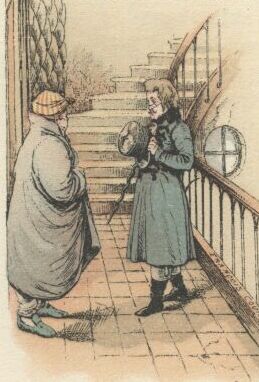
Now, if you have divined the torso and the powerful back, you will know the sweet tempered face, somewhat pale, the blue ecstatic eyes and the inquisitive nose of that good old man, when you learn that, in the morning, wearing a silk head kerchief and tightened in a dressing-gown, the illustrious professor—he is a professor—resembled an old woman so much that a young man who came from the depths of Saxony, of Weimar, or of Prussia, expressly to see him, said to him, "Forgive me, Madame!" and withdrew.
This silhouette of one of the most learned and most venerated members of the Institute betrays so well enthusiasm for study and absent-mindedness caused by application to the quest of truth, that you must recognize in it the celebrated Professor Jean Nepomucene Apollodore Marmus de Saint-Leu, one of the most admirable men of genius of our time.
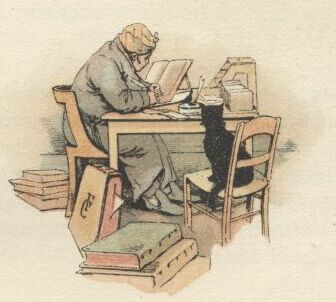
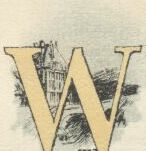
When the old man—the professor counted then sixty-two summers—had walked three steps, he turned his head at this question, hurled in an acute tone by a voice that he recognized:
"Have you a handkerchief?"
A woman stood on the step of the garden door and was watching her master with solicitude.
She seemed to be fifty years of age, and her dress indicated that she was one of those servants who are invested with full authority in household affairs.
She was darning stockings.
The man of science came back and said naively:
"Yes, Madame Adolphe, I have my handkerchief."
"Have you your spectacles?" she asked.
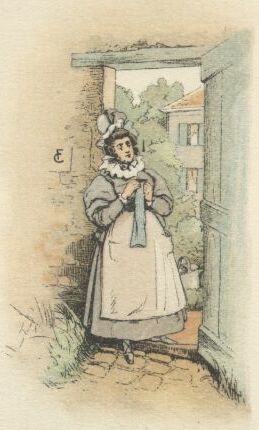
The man of science felt the side pocket of his waistcoat.
"I have them," he replied.
"Show them to me," she said. "Often you have only the case."
The professor took the case out of his pocket and showed the spectacles with a triumphant air.
"You would do well to keep them on your nose," she said.
M. de Saint-Leu put on his spectacles, after rubbing the glasses with his handkerchief.
Naturally, he thrust the handkerchief under his left arm while he set his spectacles on his nose. Then he walked a few steps towards the Rue de Fleurus and relaxed his hold on the handkerchief, which fell.
"I was sure of it," said Madame Adolphe to herself. She picked up the handkerchief and cried:
"Monsieur! Monsieur!"
"Well!" exclaimed the professor, made indignant by her watchfulness.
"I beg your pardon," he said, receiving the handkerchief.

"Have you any money?" asked Madame Adolphe with maternal solicitude.
"I need none," he replied naively, explaining thus the lives of all men of science.
"It depends," Madame Adolphe said. "If you go by way of the Pont des Arts you need one sou."
"You are right," replied the man of science, as if he were retracing instructions for a voyage to the North Pole. "I will go through the Luxembourg, the Rue de Seine, the Pont des Arts, the Louvre, the Rue du Coq, the Rue Croix-des-Petits-Champs, the Rue des Fosses- Montmartre. It is the shortest route to the Faubourg Poissonniere."
"It is three o'clock," Madame Adolphe said. "Your sister-in-law dines at six. You have three hours before you—Yes—you'll be there, but you'll be late." She searched her apron pocket for two sous, which she handed to the professor.
"Very well, then," she said to him. "Do not eat too much. You are not a glutton, but you think of other things. You are frugal, but you eat when you are absent-minded as if you had no bread at home. Take care not to make Madame Vernet, your sister-in-law, wait. If you make her wait, you will never be permitted again to go there alone, and it will be shameful for you."
Madame Adolphe returned to the threshold of the little door and from there watched her master. She had to cry to him, "To the right! To the right!" for he was turning toward the Rue Notre-Dame-des-Champs.
"And yet he is a man of science, people say," she muttered to herself. "How did he ever manage to get married? I'll ask Madame when I dress her hair."


At four o'clock, Professor Marmus was at the end of the Rue de Seine, under the arcades of the Institute. Those who know him will admit that he had done nobly, since he had taken only one hour to go through the Luxembourg and down the Rue de Seine.
There a lamentable voice, the voice of a child, plucked from the good man the two sous that Madame Adolphe had given to him. When he reached the Pont des Arts he remembered that he had to pay toll and turned back suddenly to beg for a sou from the child.

The little rascal had gone to break the coin, in order to give only one sou to his mother. She was walking up and down the Rue Mazarine with her baby at her breast.
It became necessary for the professor to turn his back on the veteran soldier who guards against the possibility of a Parisian passing over the bridge without paying the toll.
Two roads were open to him: the Pont Neuf and the Pont Royal. Curiosity makes one lose more time in Paris than anywhere else.
How may one walk without looking at those little oblong boxes, wide as the stones of the parapet, that all along the quays stimulate book lovers with posters saying, "Four Sous—Six Sous—Ten Sous—Twelve Sous—Thirty Sous?" These catacombs of glory have devoured many hours that belonged to the poets, to the philosophers and to the men of science of Paris.
Great is the number of ten-sous pieces spent in the four-sous stalls!

The professor saw a pamphlet by Vicq-d'Azyr, a complete Charles Bonnet in the edition of Fauche Borel, and an essay on Malus.
"And such then is the sum of our achievements," he said to himself. "Malus! A genius arrested in his course when he had almost captured the empire of light! But we have had Fresnel. Fresnel has done excellent things!—Oh, they will recognize some day that light is only a mode of substance."
The professor held the notice on Malus. He turned its pages. He had known Malus. He recalled to himself and recited the names of all the Maluses. Then he returned to Malus, to his dear Malus, for they had entered the Institute together at the return to Paris of the expedition to Egypt. Ah! It was then the Institute of France and not a mass of disunited Academies.
"The Emperor had preserved," said Marmus to himself, "the saintly idea of the Convention. I remember," he muttered aloud, "what he said to me when I was presented to him as a member of the Institute. Napoleon the First said, 'Marmus, I am the Emperor of the French, but you are the King of the infinitely little and you will organize them as I have organized the Empire.' Ah, he was a very great man and a man of wit! The French appreciated this too late."
The professor replaced Malus and the essay on him in the ten-sous stall, without remarking how often hope had been lit and extinguished alternately in the gray eyes of an old woman seated on a stool in an angle of the quay.
"He was there," Marmus said, pointing to the Tuileries on the opposite bank of the river. "I saw him reviewing his sublime troops! I saw him thin, ardent as the sands of Egypt; but, as soon as he became Emperor, he grew fat and good-natured, for all fat men are excellent—this is why Sinard is thin, he is a gall-making machine. But would Napoleon have supported my theory?"


It was the hour at which they went to the dinner table in the house of Marmus's sister-in-law. The professor walked slowly toward the Chamber of Deputies, asking himself if his theory might have had Napoleon's support. He could no longer judge Napoleon save from that point of view. Did Napoleon's genius coincide with that of Marmus in regard to the assimilation of things engendered by an attraction perpetual and continuous?

"No, Baron Sinard was a worshipper of power. He would have gone to the Emperor and told him that my theory was the inspiration of an atheist. And Napoleon, who has done a great deal of religious sermonizing for political reasons, would have persecuted me. He had no love for ideas. He was a courtier of facts! Moreover, in Napoleon's time, it would not have been possible for me to communicate freely with Germany. Would they have lent me their aid—Wytheimler, Grosthuys, Scheele, Stamback, Wagner?
"To make men of science agree—men of science agree!—the Emperor should have made peace; in time of peace, perhaps, he would have taken an interest in my quarrel with Sinard! Sinard, my friend, my pupil, become my antagonist, my enemy! He, a man of genius—
"Yes, he is a man of genius. I do justice to him in the face of all the world."
At this moment the professor could talk aloud without trouble to himself or to the passers-by. He was near the Chamber of Deputies, the session was closed, all Paris was at dinner—except the man of science.

Marmus was haranguing the statues which, it must be conceded, are similar to all audiences. In France there is not an audience that is not prohibited from giving marks of approval or disapproval. Otherwise, there is not an audience that would not turn orator.
At the Iena bridge Marmus had a pain in the stomach. He heard the hoarse voice of a cab driver. Marmus thought that he was ill and let himself be ushered into the cab. He made himself comfortable in it.

When the driver asked, "Where?" Marmus replied quietly:
"Home."
"Where is your home, Monsieur?" asked the driver.
"Number three," Marmus replied.
"What street?" asked the driver.
"Ah, you are right, my friend. But this is extraordinary," he said, taking the driver into his confidence. "I have been so busy comparing the hyoides and the caracoides—yes, that's it. I will catch Sinard in the act. At the next session of the Institute he will have to yield to evidence."

The driver wrapped his ragged cloak around him. Resignedly, he was saying to himself, "I have seen many odd folks, but this one—" He heard the word "Institute."
"The Institute, Monsieur?" he asked.
"Yes, my friend, the Institute," replied Marmus.
"Well he wears the red ribbon," said the driver to himself. "Perhaps he has something to do with the Institute."
The professor, infinitely more comfortable in his cab than on the sidewalk, devoted himself entirely to solving the problem that went against his theory and would not surrender—the rascal! The cab stops at the Institute; the janitor sees the Academician and bows to him respectfully. The cab driver, his suspicions dispelled, talks with the janitor of the Institute while the illustrious professor goes—at eight in the evening—to the Academie des Sciences.
The cab driver tells the janitor where he found his fare.
"At the Iena bridge," repeats the janitor. "M. Marmus was coming back from Passy. He had dined, doubtless, with M. Planchette, one of his friends of the Academy."
"He couldn't tell me his address," says the cab driver.

"He lives in the Rue Duguay-Trouin, Number three," says the janitor.
"What a neighborhood!" exclaims the driver.
"My friend," asks of the janitor the professor who had found the door shut, "is there no meeting of the Academy to-day?"
"To-day!" exclaims the janitor. "At this hour!"
"What is the time?" asks the man of science.
"About eight o'clock," the janitor replies.
"It is late," comments M. Marmus. "Take me home, driver."
The driver goes through the quays, the Rue du Bac, falls into a tangle of wagons, returns by the Rue de Grenelle, the Croix-Rouge, the Rue Cassette, then he makes a mistake. He tries to find the Rue d'Assas, in the Rue Honore-Chevalier, in the Rue Madame, in all the impossible streets and, swearing that if he had known he would not have come so far for a hundred sous, disembarks the professor in the Rue Duguay-Trouin.
The cab driver claims an hour, for the police ordinances, that defend consumers of time in cabs from the stratagems of cab drivers, had not yet posted the walls of Paris with their protecting articles that settle in advance all difficulties.
"Very well, my friend," says M. Marmus to the cab driver. "Pay him," M. Marmus says to Madame Adolphe. "I do not feel well, my child."
"Monsieur, what did I tell you?" she exclaimed. "You have eaten too much. While you were away, I said to myself, 'It is Mme. Vernet's birthday. They will urge him at table and he will come back sick.' Well, go to bed. I will make camomile tea for you."


The professor walked through the garden into a pavilion at one of its corners, where he lived alone in order not to be disturbed by his wife.
He went up the stairway leading to his little room, and complained so much of his pains in the stomach that Madame Adolphe filled him with camomile tea.
"Ah, here is a carriage! It is Madame returning in great anxiety, I am sure," said Madame Adolphe, giving to the professor his sixth cup of camomile tea. "Now, sir, I hope that you will be able to drink it without me. Do not let it fall all over your bed. You know how Madame would laugh. You are very happy to have a little wife who is so amiable and so joyful."

"Say nothing to her, my child," exclaimed the professor, whose features expressed a sort of childish fear.
The truly great man is always more or less a child.

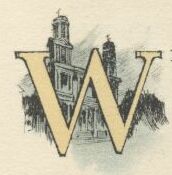
"Well, good-bye. Return in the cab, it is paid for," Madame Marmus was saying when Madame Adolphe arrived at the door.
The cab had already turned the corner. Madame Adolphe, not having seen Madame Marmus's escort, said to herself:
"Poor Madame! He must be her nephew."
Madame Marmus, a little woman, lithe, graceful, mirthful, was divinely dressed and in a fashion too young for her age, counting her twenty-five years as a wife. Nevertheless, she wore well a gown with small pink stripes, a cape embroidered and edged with lace, boots pretty as the wings of a butterfly. She carried in her hand a pink hat with peach flowers.
"You see, Madame Adolphe," she said, "my hair is all uncurled. I told you that in this hot weather it should be dressed in bandeaux."
"Madame," the servant replied, "Monsieur is very sick. You let him eat too much."

"What could I do?" Madame Marmus replied. "He was at one end of the table and I at the other. He returned without me, as his habit is! Poor little man! I will go to him as soon as I change my dress."
Madame Adolphe returns to the pavilion to propose an emetic, and scolds the professor for not having returned with Madame Marmus.
"Since you wished to come in a cab, you might have spared me the expense of the one that Madame Marmus took. The charge for your cab was an hour. Did you stop anywhere?"
"At the Institute," he replied.
"At the Institute! Where did you take the cab?" she asked.
"In front of a bridge, I think," he replied.
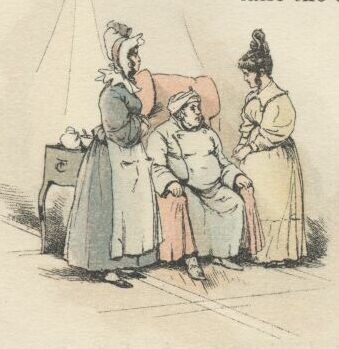
"Was it still daylight?" she asked.
"Almost," he said.
"Then you did not go to Madame Vernet's!" exclaimed Madame Adolphe.
"Why did you not come to Madame Vernet's?" asked his wife.
Madame Marmus, having come to the door on the tips of her toes, had heard Madame Adolphe's exclamation. She did not wish to see Madame Adolphe's astonishment. Surely Madame Adolphe could not have forgotten the assurance with which the professor's wife had placed him in imagination at Madame Vernet's table.
"My dear child, I do not know," said the professor in a repentant tone.
"Then you have not dined," said Madame Marmus, whose attitude remained that of the purest innocence.
"With what could he have dined, Madame? He had two sous," said Madame Adolphe, looking at Madame Marmus with an accusing air.
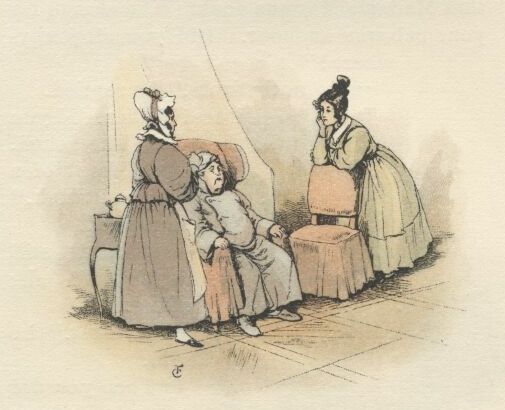
"Ah, I am truly to be pitied, my poor Madame Adolphe," said Madame Marmus. "This sort of thing has been going on for twenty years, and I am not yet accustomed to it. Six days after our wedding, we were going out of our room one morning to take breakfast. M. Marmus hears the drum of the Polytechnic School pupils of whom he was the professor. He quits me to go and see them pass. I was nineteen years of age and when I pouted, you cannot guess what he said to me. He said, 'These young people are the flower and the glory of France!' This is how my marriage began. You can judge of the rest."
"Oh, Monsieur, is it possible?" asked Madame Adolphe with an indignant air.
"I have cornered Sinard!" exclaimed M. Marmus triumphantly.
"Oh, he would let himself die!" exclaimed Madame Adolphe.
"Get something for him to eat," said Madame Marmus. "He would let himself do anything. Ah, my good Madame Adolphe, a man of science, you see, is a man who knows nothing—of life."
The malady was cured by a cataplasm of Italian cheese that the man of science ate without knowing what he was eating, for he held Sinard in a corner—
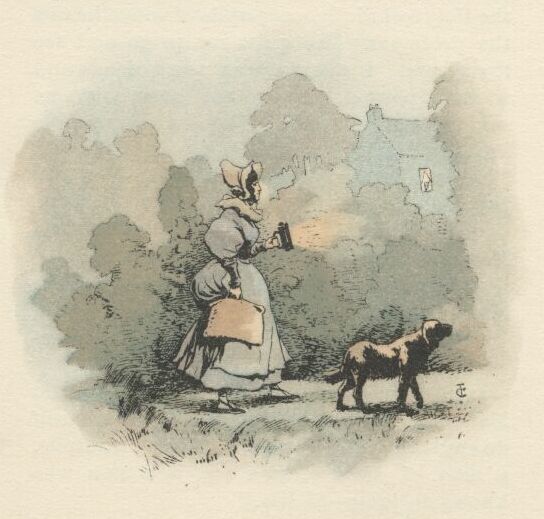
"Poor Madame," said the kind Madame Adolphe. "I pity you. He was really so absent-minded as that!"
And Madame Adolphe forgot the strange avowal of her mistress.

End of the Project Gutenberg EBook of A Street Of Paris And Its Inhabitant
by Honore De Balzac
*** END OF THIS PROJECT GUTENBERG EBOOK A STREET OF PARIS ***
***** This file should be named 8150-h.htm or 8150-h.zip *****
This and all associated files of various formats will be found in:
https://www.gutenberg.org/8/1/5/8150/
Produced by Dagny, John Bickers and David Widger
Updated editions will replace the previous one--the old editions
will be renamed.
Creating the works from public domain print editions means that no
one owns a United States copyright in these works, so the Foundation
(and you!) can copy and distribute it in the United States without
permission and without paying copyright royalties. Special rules,
set forth in the General Terms of Use part of this license, apply to
copying and distributing Project Gutenberg-tm electronic works to
protect the PROJECT GUTENBERG-tm concept and trademark. Project
Gutenberg is a registered trademark, and may not be used if you
charge for the eBooks, unless you receive specific permission. If you
do not charge anything for copies of this eBook, complying with the
rules is very easy. You may use this eBook for nearly any purpose
such as creation of derivative works, reports, performances and
research. They may be modified and printed and given away--you may do
practically ANYTHING with public domain eBooks. Redistribution is
subject to the trademark license, especially commercial
redistribution.
*** START: FULL LICENSE ***
THE FULL PROJECT GUTENBERG LICENSE
PLEASE READ THIS BEFORE YOU DISTRIBUTE OR USE THIS WORK
To protect the Project Gutenberg-tm mission of promoting the free
distribution of electronic works, by using or distributing this work
(or any other work associated in any way with the phrase "Project
Gutenberg"), you agree to comply with all the terms of the Full Project
Gutenberg-tm License (available with this file or online at
https://gutenberg.org/license).
Section 1. General Terms of Use and Redistributing Project Gutenberg-tm
electronic works
1.A. By reading or using any part of this Project Gutenberg-tm
electronic work, you indicate that you have read, understand, agree to
and accept all the terms of this license and intellectual property
(trademark/copyright) agreement. If you do not agree to abide by all
the terms of this agreement, you must cease using and return or destroy
all copies of Project Gutenberg-tm electronic works in your possession.
If you paid a fee for obtaining a copy of or access to a Project
Gutenberg-tm electronic work and you do not agree to be bound by the
terms of this agreement, you may obtain a refund from the person or
entity to whom you paid the fee as set forth in paragraph 1.E.8.
1.B. "Project Gutenberg" is a registered trademark. It may only be
used on or associated in any way with an electronic work by people who
agree to be bound by the terms of this agreement. There are a few
things that you can do with most Project Gutenberg-tm electronic works
even without complying with the full terms of this agreement. See
paragraph 1.C below. There are a lot of things you can do with Project
Gutenberg-tm electronic works if you follow the terms of this agreement
and help preserve free future access to Project Gutenberg-tm electronic
works. See paragraph 1.E below.
1.C. The Project Gutenberg Literary Archive Foundation ("the Foundation"
or PGLAF), owns a compilation copyright in the collection of Project
Gutenberg-tm electronic works. Nearly all the individual works in the
collection are in the public domain in the United States. If an
individual work is in the public domain in the United States and you are
located in the United States, we do not claim a right to prevent you from
copying, distributing, performing, displaying or creating derivative
works based on the work as long as all references to Project Gutenberg
are removed. Of course, we hope that you will support the Project
Gutenberg-tm mission of promoting free access to electronic works by
freely sharing Project Gutenberg-tm works in compliance with the terms of
this agreement for keeping the Project Gutenberg-tm name associated with
the work. You can easily comply with the terms of this agreement by
keeping this work in the same format with its attached full Project
Gutenberg-tm License when you share it without charge with others.
1.D. The copyright laws of the place where you are located also govern
what you can do with this work. Copyright laws in most countries are in
a constant state of change. If you are outside the United States, check
the laws of your country in addition to the terms of this agreement
before downloading, copying, displaying, performing, distributing or
creating derivative works based on this work or any other Project
Gutenberg-tm work. The Foundation makes no representations concerning
the copyright status of any work in any country outside the United
States.
1.E. Unless you have removed all references to Project Gutenberg:
1.E.1. The following sentence, with active links to, or other immediate
access to, the full Project Gutenberg-tm License must appear prominently
whenever any copy of a Project Gutenberg-tm work (any work on which the
phrase "Project Gutenberg" appears, or with which the phrase "Project
Gutenberg" is associated) is accessed, displayed, performed, viewed,
copied or distributed:
This eBook is for the use of anyone anywhere at no cost and with
almost no restrictions whatsoever. You may copy it, give it away or
re-use it under the terms of the Project Gutenberg License included
with this eBook or online at www.gutenberg.org
1.E.2. If an individual Project Gutenberg-tm electronic work is derived
from the public domain (does not contain a notice indicating that it is
posted with permission of the copyright holder), the work can be copied
and distributed to anyone in the United States without paying any fees
or charges. If you are redistributing or providing access to a work
with the phrase "Project Gutenberg" associated with or appearing on the
work, you must comply either with the requirements of paragraphs 1.E.1
through 1.E.7 or obtain permission for the use of the work and the
Project Gutenberg-tm trademark as set forth in paragraphs 1.E.8 or
1.E.9.
1.E.3. If an individual Project Gutenberg-tm electronic work is posted
with the permission of the copyright holder, your use and distribution
must comply with both paragraphs 1.E.1 through 1.E.7 and any additional
terms imposed by the copyright holder. Additional terms will be linked
to the Project Gutenberg-tm License for all works posted with the
permission of the copyright holder found at the beginning of this work.
1.E.4. Do not unlink or detach or remove the full Project Gutenberg-tm
License terms from this work, or any files containing a part of this
work or any other work associated with Project Gutenberg-tm.
1.E.5. Do not copy, display, perform, distribute or redistribute this
electronic work, or any part of this electronic work, without
prominently displaying the sentence set forth in paragraph 1.E.1 with
active links or immediate access to the full terms of the Project
Gutenberg-tm License.
1.E.6. You may convert to and distribute this work in any binary,
compressed, marked up, nonproprietary or proprietary form, including any
word processing or hypertext form. However, if you provide access to or
distribute copies of a Project Gutenberg-tm work in a format other than
"Plain Vanilla ASCII" or other format used in the official version
posted on the official Project Gutenberg-tm web site (www.gutenberg.org),
you must, at no additional cost, fee or expense to the user, provide a
copy, a means of exporting a copy, or a means of obtaining a copy upon
request, of the work in its original "Plain Vanilla ASCII" or other
form. Any alternate format must include the full Project Gutenberg-tm
License as specified in paragraph 1.E.1.
1.E.7. Do not charge a fee for access to, viewing, displaying,
performing, copying or distributing any Project Gutenberg-tm works
unless you comply with paragraph 1.E.8 or 1.E.9.
1.E.8. You may charge a reasonable fee for copies of or providing
access to or distributing Project Gutenberg-tm electronic works provided
that
- You pay a royalty fee of 20% of the gross profits you derive from
the use of Project Gutenberg-tm works calculated using the method
you already use to calculate your applicable taxes. The fee is
owed to the owner of the Project Gutenberg-tm trademark, but he
has agreed to donate royalties under this paragraph to the
Project Gutenberg Literary Archive Foundation. Royalty payments
must be paid within 60 days following each date on which you
prepare (or are legally required to prepare) your periodic tax
returns. Royalty payments should be clearly marked as such and
sent to the Project Gutenberg Literary Archive Foundation at the
address specified in Section 4, "Information about donations to
the Project Gutenberg Literary Archive Foundation."
- You provide a full refund of any money paid by a user who notifies
you in writing (or by e-mail) within 30 days of receipt that s/he
does not agree to the terms of the full Project Gutenberg-tm
License. You must require such a user to return or
destroy all copies of the works possessed in a physical medium
and discontinue all use of and all access to other copies of
Project Gutenberg-tm works.
- You provide, in accordance with paragraph 1.F.3, a full refund of any
money paid for a work or a replacement copy, if a defect in the
electronic work is discovered and reported to you within 90 days
of receipt of the work.
- You comply with all other terms of this agreement for free
distribution of Project Gutenberg-tm works.
1.E.9. If you wish to charge a fee or distribute a Project Gutenberg-tm
electronic work or group of works on different terms than are set
forth in this agreement, you must obtain permission in writing from
both the Project Gutenberg Literary Archive Foundation and Michael
Hart, the owner of the Project Gutenberg-tm trademark. Contact the
Foundation as set forth in Section 3 below.
1.F.
1.F.1. Project Gutenberg volunteers and employees expend considerable
effort to identify, do copyright research on, transcribe and proofread
public domain works in creating the Project Gutenberg-tm
collection. Despite these efforts, Project Gutenberg-tm electronic
works, and the medium on which they may be stored, may contain
"Defects," such as, but not limited to, incomplete, inaccurate or
corrupt data, transcription errors, a copyright or other intellectual
property infringement, a defective or damaged disk or other medium, a
computer virus, or computer codes that damage or cannot be read by
your equipment.
1.F.2. LIMITED WARRANTY, DISCLAIMER OF DAMAGES - Except for the "Right
of Replacement or Refund" described in paragraph 1.F.3, the Project
Gutenberg Literary Archive Foundation, the owner of the Project
Gutenberg-tm trademark, and any other party distributing a Project
Gutenberg-tm electronic work under this agreement, disclaim all
liability to you for damages, costs and expenses, including legal
fees. YOU AGREE THAT YOU HAVE NO REMEDIES FOR NEGLIGENCE, STRICT
LIABILITY, BREACH OF WARRANTY OR BREACH OF CONTRACT EXCEPT THOSE
PROVIDED IN PARAGRAPH F3. YOU AGREE THAT THE FOUNDATION, THE
TRADEMARK OWNER, AND ANY DISTRIBUTOR UNDER THIS AGREEMENT WILL NOT BE
LIABLE TO YOU FOR ACTUAL, DIRECT, INDIRECT, CONSEQUENTIAL, PUNITIVE OR
INCIDENTAL DAMAGES EVEN IF YOU GIVE NOTICE OF THE POSSIBILITY OF SUCH
DAMAGE.
1.F.3. LIMITED RIGHT OF REPLACEMENT OR REFUND - If you discover a
defect in this electronic work within 90 days of receiving it, you can
receive a refund of the money (if any) you paid for it by sending a
written explanation to the person you received the work from. If you
received the work on a physical medium, you must return the medium with
your written explanation. The person or entity that provided you with
the defective work may elect to provide a replacement copy in lieu of a
refund. If you received the work electronically, the person or entity
providing it to you may choose to give you a second opportunity to
receive the work electronically in lieu of a refund. If the second copy
is also defective, you may demand a refund in writing without further
opportunities to fix the problem.
1.F.4. Except for the limited right of replacement or refund set forth
in paragraph 1.F.3, this work is provided to you 'AS-IS' WITH NO OTHER
WARRANTIES OF ANY KIND, EXPRESS OR IMPLIED, INCLUDING BUT NOT LIMITED TO
WARRANTIES OF MERCHANTIBILITY OR FITNESS FOR ANY PURPOSE.
1.F.5. Some states do not allow disclaimers of certain implied
warranties or the exclusion or limitation of certain types of damages.
If any disclaimer or limitation set forth in this agreement violates the
law of the state applicable to this agreement, the agreement shall be
interpreted to make the maximum disclaimer or limitation permitted by
the applicable state law. The invalidity or unenforceability of any
provision of this agreement shall not void the remaining provisions.
1.F.6. INDEMNITY - You agree to indemnify and hold the Foundation, the
trademark owner, any agent or employee of the Foundation, anyone
providing copies of Project Gutenberg-tm electronic works in accordance
with this agreement, and any volunteers associated with the production,
promotion and distribution of Project Gutenberg-tm electronic works,
harmless from all liability, costs and expenses, including legal fees,
that arise directly or indirectly from any of the following which you do
or cause to occur: (a) distribution of this or any Project Gutenberg-tm
work, (b) alteration, modification, or additions or deletions to any
Project Gutenberg-tm work, and (c) any Defect you cause.
Section 2. Information about the Mission of Project Gutenberg-tm
Project Gutenberg-tm is synonymous with the free distribution of
electronic works in formats readable by the widest variety of computers
including obsolete, old, middle-aged and new computers. It exists
because of the efforts of hundreds of volunteers and donations from
people in all walks of life.
Volunteers and financial support to provide volunteers with the
assistance they need, is critical to reaching Project Gutenberg-tm's
goals and ensuring that the Project Gutenberg-tm collection will
remain freely available for generations to come. In 2001, the Project
Gutenberg Literary Archive Foundation was created to provide a secure
and permanent future for Project Gutenberg-tm and future generations.
To learn more about the Project Gutenberg Literary Archive Foundation
and how your efforts and donations can help, see Sections 3 and 4
and the Foundation web page at https://www.pglaf.org.
Section 3. Information about the Project Gutenberg Literary Archive
Foundation
The Project Gutenberg Literary Archive Foundation is a non profit
501(c)(3) educational corporation organized under the laws of the
state of Mississippi and granted tax exempt status by the Internal
Revenue Service. The Foundation's EIN or federal tax identification
number is 64-6221541. Its 501(c)(3) letter is posted at
https://pglaf.org/fundraising. Contributions to the Project Gutenberg
Literary Archive Foundation are tax deductible to the full extent
permitted by U.S. federal laws and your state's laws.
The Foundation's principal office is located at 4557 Melan Dr. S.
Fairbanks, AK, 99712., but its volunteers and employees are scattered
throughout numerous locations. Its business office is located at
809 North 1500 West, Salt Lake City, UT 84116, (801) 596-1887, email
[email protected]. Email contact links and up to date contact
information can be found at the Foundation's web site and official
page at https://pglaf.org
For additional contact information:
Dr. Gregory B. Newby
Chief Executive and Director
[email protected]
Section 4. Information about Donations to the Project Gutenberg
Literary Archive Foundation
Project Gutenberg-tm depends upon and cannot survive without wide
spread public support and donations to carry out its mission of
increasing the number of public domain and licensed works that can be
freely distributed in machine readable form accessible by the widest
array of equipment including outdated equipment. Many small donations
($1 to $5,000) are particularly important to maintaining tax exempt
status with the IRS.
The Foundation is committed to complying with the laws regulating
charities and charitable donations in all 50 states of the United
States. Compliance requirements are not uniform and it takes a
considerable effort, much paperwork and many fees to meet and keep up
with these requirements. We do not solicit donations in locations
where we have not received written confirmation of compliance. To
SEND DONATIONS or determine the status of compliance for any
particular state visit https://pglaf.org
While we cannot and do not solicit contributions from states where we
have not met the solicitation requirements, we know of no prohibition
against accepting unsolicited donations from donors in such states who
approach us with offers to donate.
International donations are gratefully accepted, but we cannot make
any statements concerning tax treatment of donations received from
outside the United States. U.S. laws alone swamp our small staff.
Please check the Project Gutenberg Web pages for current donation
methods and addresses. Donations are accepted in a number of other
ways including including checks, online payments and credit card
donations. To donate, please visit: https://pglaf.org/donate
Section 5. General Information About Project Gutenberg-tm electronic
works.
Professor Michael S. Hart was the originator of the Project Gutenberg-tm
concept of a library of electronic works that could be freely shared
with anyone. For thirty years, he produced and distributed Project
Gutenberg-tm eBooks with only a loose network of volunteer support.
Project Gutenberg-tm eBooks are often created from several printed
editions, all of which are confirmed as Public Domain in the U.S.
unless a copyright notice is included. Thus, we do not necessarily
keep eBooks in compliance with any particular paper edition.
Each eBook is in a subdirectory of the same number as the eBook's
eBook number, often in several formats including plain vanilla ASCII,
compressed (zipped), HTML and others.
Corrected EDITIONS of our eBooks replace the old file and take over
the old filename and etext number. The replaced older file is renamed.
VERSIONS based on separate sources are treated as new eBooks receiving
new filenames and etext numbers.
Most people start at our Web site which has the main PG search facility:
https://www.gutenberg.org
This Web site includes information about Project Gutenberg-tm,
including how to make donations to the Project Gutenberg Literary
Archive Foundation, how to help produce our new eBooks, and how to
subscribe to our email newsletter to hear about new eBooks.
EBooks posted prior to November 2003, with eBook numbers BELOW #10000,
are filed in directories based on their release date. If you want to
download any of these eBooks directly, rather than using the regular
search system you may utilize the following addresses and just
download by the etext year.
https://www.gutenberg.org/etext06
(Or /etext 05, 04, 03, 02, 01, 00, 99,
98, 97, 96, 95, 94, 93, 92, 92, 91 or 90)
EBooks posted since November 2003, with etext numbers OVER #10000, are
filed in a different way. The year of a release date is no longer part
of the directory path. The path is based on the etext number (which is
identical to the filename). The path to the file is made up of single
digits corresponding to all but the last digit in the filename. For
example an eBook of filename 10234 would be found at:
https://www.gutenberg.org/1/0/2/3/10234
or filename 24689 would be found at:
https://www.gutenberg.org/2/4/6/8/24689
An alternative method of locating eBooks:
https://www.gutenberg.org/GUTINDEX.ALL